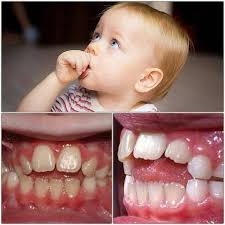Thumb Sucking Teeth: Tips to Break the Habit and Protect Your Child’s Smile
Welcome to our comprehensive guide on addressing “thumb-sucking teeth” issues in children. Thumb sucking is a common childhood habit, but it can have implications for dental health. In this article, we’ll explore the impact of thumb sucking on teeth and provide practical strategies to help your child break the habit and maintain a healthy smile.
The Impact of Thumb Sucking on Teeth

Understanding the Connection: Thumb Sucking and Dental Health
Thumb sucking is a natural reflex for infants, providing comfort and security. However, when this habit persists beyond infancy and into the primary years, it can lead to various dental concerns. Understanding the impact of thumb sucking on teeth is essential for parents and caregivers.
Signs and Symptoms
Recognizing Dental Red Flags: What to Watch For
To address thumb sucking’s impact on teeth, it’s crucial to recognize the signs and symptoms early on. By being aware of these dental red flags, parents can take proactive steps to protect their child’s oral health.
When Does Thumb Sucking Become a Concern?
Understanding the Timeline: When to Take Action
Thumb sucking is a common behavior among infants and toddlers. However, parents often wonder when it becomes a concern for dental health. Let’s explore the timeline and when intervention may be necessary.
Strategies to Stop Thumb Sucking
Helping Your Child Break the Habit: Effective Strategies
If you’ve identified that thumb sucking is affecting your child’s dental health, don’t worry; there are effective strategies to help them break the habit. Let’s discover practical methods and expert advice to support your child’s journey toward a thumb-sucking-free smile.
Dental Intervention
When Professional Help Is Needed: Dental Solutions
In some cases, dental intervention may be required to address the consequences of thumb sucking on teeth. Learn about the various dental treatments and interventions available to protect your child’s dental health.
The Role of Positive Reinforcement
Encouraging Your Child: Positive Approaches to Quit Thumb Sucking
When helping your child break the thumb-sucking habit, positive reinforcement can play a pivotal role. Discover effective and nurturing ways to encourage your child throughout their journey toward healthier dental habits.
Maintaining Good Dental Health
Beyond Thumb Sucking: Tips for Lifelong Dental Wellness
While addressing thumb sucking is crucial, it’s equally important to maintain good dental health for your child. Explore valuable tips and practices to ensure a lifetime of strong and healthy teeth.
Seeking Professional Guidance
Partnering with Experts: When to Consult a Pediatric Dentist
Sometimes, navigating thumb-sucking issues may require professional guidance. Learn when it’s appropriate to consult with a pediatric dentist or dental specialist and how they can provide tailored solutions for your child.
FAQs to “Thumb Sucking Teeth”:
Q1. What is thumb sucking teeth?
A: Thumb-sucking teeth refer to dental issues that can arise when a child sucks their thumb for an extended period, potentially causing misalignment and other dental problems.
Q2. At what age does thumb sucking typically start?
A: Thumb sucking usually begins during infancy and may continue into toddlerhood. Most children naturally outgrow this habit by age 4.
Q3. When should parents be concerned about thumb sucking’s impact on teeth?
A: Parents should be concerned if thumb sucking continues beyond age 4 or if signs of dental problems, such as teeth misalignment or speech issues, become evident.
Q4. Can thumb-sucking lead to dental issues?
A: Yes, prolonged thumb sucking can lead to dental problems, including teeth misalignment, open bite, and changes in the roof of the mouth (palate).
Q5. What are the signs that thumb sucking is affecting my child’s dental health?
A: Signs may include changes in tooth alignment, speech difficulties, and open bite (gap between upper and lower front teeth).
Q6. What strategies can parents use to help their child stop thumb-sucking?
A: Effective strategies include positive reinforcement, offering alternatives, using dental appliances (if necessary), and consulting with a pediatric dentist.
Q7. Is thumb-sucking harmful to a child’s emotional well-being?
A: While thumb sucking itself is a comforting behavior, dental problems that result from prolonged thumb sucking can impact a child’s self-esteem.
Q8. Are there dental interventions available for thumb-sucking teeth issues?
A: Yes, dental interventions may include orthodontic treatments like braces, appliances to discourage thumb sucking, or speech therapy if speech issues arise.
Q9. Can thumb-sucking be a sign of underlying stress or anxiety in a child?
A: Yes, in some cases, thumb-sucking may be a response to stress or anxiety. It’s important to consider emotional factors when addressing the habit.
Q10. How can parents maintain good dental health in their child beyond addressing thumb sucking?
A: Maintaining good dental health involves regular dental check-ups, a balanced diet, and teaching proper oral hygiene habits, such as brushing and flossing.
Conclusion
In conclusion, addressing thumb sucking’s impact on teeth is an important aspect of ensuring your child’s dental health. By understanding the consequences, recognizing the signs, and employing effective strategies, parents can guide their children toward a thumb-sucking-free smile.




